- Home
- Ben Counter
Van Horstmann Page 8
Van Horstmann Read online
Page 8
He opened up a pane of polished crystal in the heart of the puzzle box’s bloom.
The air above the desk shimmered, as if something beyond a veil of reality was struggling. Then that veil tore and glistening limbs could just be glimpsed, pumping and writhing like organs in a still-living chest. An eye glared out madly, a gnashing maw made wet chomping noises. Its breath could be heard now, a grinding, panting sound that would surely have brought alarmed stewards in from outside if not for the magical silence.
The puzzle box was more than a toy, although it could have been mistaken for one. It was a magical artefact designed to keep objects safe and screened from outside eyes. Van Horstmann had wondered, at first, what use Vek had made of it. Perhaps the magister had not even known what it could do. Van Horstmann had known as soon as he took it from the dead wizard’s robe. He had seen its like before, illustrated in the pages of books. Books that according to every law of the land neither he, nor anyone else, should ever read.
The daemon burst from its invisible cage. It looked the same as van Horstmann had seen it last, below the Imperial Palace. It was scorched and battered, some of its eye sockets red and raw where the eyes had been put out, teeth in its lolling maw broken, muscle and ill-formed bone poking through the skin.
It propelled itself onto the ceiling, rattling the braziers hanging there and sending embers fluttering down.
‘You,’ it hissed, drawing out the syllable into a rattling grind.
Van Horstmann threw out his hands and bands of white fire appeared around the daemon, like the bars of a spherical cage. ‘I let you live,’ said van Horstmann. ‘I could have destroyed you but I did not.’
‘Destroy me? Ha! You flatter yourself, you filth-dripper, you walking afterbirth! You less-than-nothing!’
Van Horstmann let the image in his mind contract and the bars closed in. The daemon writhed and hissed as its limbs touched the flame. ‘And I still can,’ he said. ‘I invoke the pact that binds all your kind.’
‘Lick the rump of Sigmar’s corpse!’ slurred the daemon back. ‘Speak your drivel to his holy fundament!’
‘I let you live!’ continued van Horstmann. ‘That means I saved your existence. That means I own you.’
‘Leprous ordure-heap! Well of bubbling pus!’
‘Tell me it is not so!’ demanded van Horstmann. ‘I own you. You are mine. Tell me you are not!’
The daemon drew itself against the ceiling and hissed, flicking specks of drool across the desktop.
‘I thought as much,’ said van Horstmann. ‘I shall not be a disagreeable master. No doubt more tolerable than whatever power put you in that girl’s body.’
‘By the mountains of the aethyr, she stank,’ said the daemon. ‘Her flesh begged me for corruption. Her mind, too. That voice in the back of her head that lusted to be violated and depraved. She mourned me when I left her. She begged me to return.’
‘Now you are rid of her, daemon. Now you are mine. Speak your name.’
The daemon roiled and hissed. A limb touched the cage of white flame and it recoiled, burning.
‘Speak it!’
‘Hiskernaath!’ yelled the daemon. The syllables seemed to burn its mouth as it spat them out. ‘I was the Red Stag of Chalons. I was the Beast of Kolnendorf. But in the tongue of the aethyr my true name is Hiskernaath!’ The daemon gasped, the effort of speaking the truth, something so alien to it, exhausting. ‘Are you pleased, fleshling? Does your heart swell with pride? Do you think you have won?’
‘There is no winning or losing,’ replied van Horstman. He had not raised his voice, no matter how the daemon railed against him. ‘Above us is the same master. Far above, so far that his eye might never fall upon us, but under his mantle we both fall. I know what you are, Hiskernaath. You were torn from his flesh like a seed from the pod. You are a fragment of his will.’
‘You speak,’ said Hiskernaath, ‘of the God of Lies.’
‘I walked,’ said van Horstmann, ‘on the Red Road that leads to the Well of Malice. I drank of its waters. I have stood before the gates of the Eternal City, and heard the song that bade me enter. I tore a tower from its battlements and installed it in my own soul. I looked upon the Isle of Mists and returned with my life. I have travelled, daemon, and I have learned. My mind unshackled, it flew through the coils of the aethyr and returned to my body with these truths intact. My studies are a long way from completion, but I know enough to commune with the Liar Prince. I knew enough to defeat you, and bind you, in the name of he whom we both serve.’
‘Tzeentch,’ hissed Hiskernaath.
‘Tzeentch,’ said van Horstmann.
‘You are a daemonologist.’
‘Not so,’ replied the wizard. ‘I am a seeker of knowledge. I followed the daemon-binder’s path and I walk on the path of Light. Both are my calling. Perhaps I will walk other paths. As it is I have the means to both enslave you, and destroy you if it suits me. Remember that, daemon. I am a magister of the Light Order and we are not known for our mercy to daemonkind.’
‘Then,’ said Hiskernaath, ‘how may this one serve you?’
Van Horstmann regarded the daemon for a moment. It was an inhuman, disgusting thing, a combination of all the worst parts of spiders, vermin, maggots and the ill-formed things that lived beneath the sea – but it was also a sentient thing and its body language could be read after a fashion. It was in submission now, like a slave prostrate before its owner. Gills fanned open and its talons were laid flat against the ceiling, like tools at van Horstmann’s disposal.
‘I know enough,’ said van Horstmann, ‘to be certain that as a daemon, you lie. The most mindless of you has within it the capacity for deceit. It is in your nature to lie to me now. You have no intention of serving. You will tie me up in one of the riddles of which Tzeentch is so fond, and at the culmination of my plans you will reveal the loophole you have exploited to turn on me. And I will be destroyed, like so many others before me. Not this time, daemon. Not this master.’
Van Horstmann unfastened his robe, which was still that of an acolyte. Onto his upper chest were tattooed long streams of archaic characters.
‘I walked the Valley of Centuries,’ he said, ‘and found there the pedestal on which rests the Obsidian Codex, carved by madmen into panels of stone. These are the words I read there, the pact which bound Kyrinex the Maw to the Heresiarch Coven. They were written before Sigmar was born, before these lands of men existed, and they have been read by no man since save I.’ Van Horstmann pulled his robe open to reveal his whole torso was covered with the words. ‘It is a contract, daemon. Unbreakable. And you will sign.’
‘Come, master, you insult me!’ said Hiskernaath. ‘We follow the same dark star, you and I. You are my master. You own me. One such as I can never betray one such as you. No contract is needed, master. Not when Lord Tzeentch himself blesses my servitude!’
The daemon did a good job of forcing genuine hurt and obsequiousness into its voice. Someone who had not walked the roads that van Horstmann had, someone who had not studied the most ancient works of daemonology, might have been convinced.
‘Sign, daemon,’ said van Horstmann. He indicated the space on his abdomen, left bare for a signature. ‘Make your mark.’
One of the flame-cage’s bars vanished. Hiskernaath paused then, as if invisible hands were forcing him, and uncoiled a limb towards van Horstmann. Pores opened on the end of its tentacle-like tip and oozed greenish acid that hissed and spat where it dripped on the chamber floor.
For a moment the daemon seemed about to protest one final time. Then it touched the limb to the bare spot on van Horstmann’s torso.
Van Horstmann winced. The unsavoury smell of burned skin mixed with the daemon’s own stench. When the daemon withdrew its limb, its mark, a letter of that same ancient alphabet, was scorched onto van Horstmann.
He took in a long breath. The contract was signed. Though every such contract was fallible, for a daemon could weasel its way out of any obligation
, it would take centuries for Hiskernaath to find the flaws that would release it from servitude. That was more than enough time for van Horstmann to do what he had come to the Light College to do.
The Light Pyramid was one of the great secrets of Altdorf, but there were greater.
True, the general population did not know it was there. The inhabitants of the Buchbinder district ascribed the strange geography of their home to some wild magic resulting from ley lines or a rogue spell in ages past, and the Light Order did nothing to discourage such beliefs. But there were plenty of people who knew of the pyramid, not least the magisters of the other seven orders along with those who had to deal with the Colleges of Magic as political entities: the Imperial Court, the churches of the Empire’s major faiths, the orders of witch hunters and others.
A greater secret was that there was more than one pyramid. The second pyramid was a mirror of the first, built underground and inverted, its point as far beneath the ground as the Light College’s pinnacle was above it. These were the vaults of the Light Order, a repository for everything they did not want seen by anyone outside the order. It was here, rather than the first pyramid’s library, that they kept safe the most valuable and dangerous books, either those penned by the order’s earliest and greatest magisters or tomes of blasphemy captured intact and read, under the strictest supervision, to provide an insight into supernatural threats like daemonkind and the undead. In these vaults were kept magical artefacts too valuable and too powerful to entrust to the pyramid above ground – the staves of the great magisters, ritual knives and blood chalices for the most direct of sacrifices, enchanted objects and armaments of every kind.
The magisters of the Fourth Circle, who answered directly to the Grand Magister and who numbered only half a dozen at any one time, were masters of these vaults. They were kept in strict order and perfectly maintained, in keeping with the mindset of the Light Order. The Fourth Circle did not mix with the rest of the order and they guarded their domain with such fervour that all save the Grand Magister were fortunate to even enter the upper vaults with any regularity.
It was therefore Elrisse himself who led the newly-appointed magisters into the vaults to witness what an acolyte could not – some of the greatest secrets that existed in Altdorf, in the whole of the Empire, painstakingly catalogued and studied by the jealous Fourth Circle.
Van Horstmann stood before a pedestal on which sat one such secret. It was one of over two dozen displayed in this vault, one of the uppermost vaults, a long room of cut marble and false pillars. Here were displayed magical swords and talismans created by the Light Order: an amulet of cold-forged iron in the form of two intertwined snakes, a chunk of crystal filled with dancing lights, a golden torc that slowly wept drops of blood. Van Horstmann had ignored most of them, given a few of them a glance, and moved to this pedestal at the far end of the chamber.
‘The Skull of Katam,’ said Magister Pendorf. Pendorf was of the Fourth Circle and was the oldest man van Horstmann had ever seen, his face little more than a sheaf of wrinkled skin behind a straggly grey beard. His voice was so dry and strained that it almost hurt to listen to it. He had shadowed van Horstmann the moment he entered, like the owner of a confectioner’s following a quick-fingered child.
‘From the barrows of the Mourkain,’ said van Horstmann.
‘You are learned,’ said Pendorf.
‘We seek knowledge,’ replied van Horstmann. ‘It is our weapon. We all seek it, you guard it.’
‘Quite so.’
The Skull of Katam had, presumably, once been a human skull. Perhaps it had looked like a mundane skull when it was dug up from the burial mound that had once been a part of the prehistoric Mourkain empire. Now it was plated in silver and covered in jewels. Its teeth were diamonds and its eyes two fat rubies. Sigils were cut into the silver, each a variation of a star with eight points.
‘Sigmund Haal died a week after he found it,’ said van Horstmann. ‘They say it spoke to him of his death, and his heart froze solid the next night. And that whoever owns it will eventually be warned of their death, though there is nothing they can do to avoid it. Whenever it speaks, someone dies.’
‘Then I give thanks,’ said Pendorf, ‘that I have never heard it.’
Van Horstmann looked at the old man. His robes were trimmed with black and he wore around his neck a heavy amulet in the shape of a padlock. The image of a key was tattooed on his forehead. The magisters of the Fourth Circle were said to have a little madness in them, perhaps a prerequisite for the job of tending the vaults, perhaps the result of isolation from the rest of the their order and exposure to the strange magics of so many artefacts. ‘I understand that one magister of the Fourth Circle must die before another can take his place,’ said van Horstmann.
‘Nowhere is it written, but in practice, yes, that is so.’
‘Then maybe it is the Skull of Katam that decides when one of your circle is to be replaced. Perhaps it speaks, one of you hears it and is struck dead, and another takes his place. Could that not be the case?’
Pendorf did not reply. It was impossible to read any emotion from his face. It was barely any more expressive than the jewelled skull.
Van Horstmann reached for the skull.
‘No,’ said Pendorf. ‘The Skull of Katam is ill-starred. It cannot leave these vaults.’
Van Horstmann ignored him and picked up the skull. It was heavy, far heavier than mere bone. He realised it was solid right through.
Power crackled through his fingers where they touched the skull. Sparks of white magic arced from his palms. The rubies glowed brighter, a pink-red light bathing van Horstmann’s face. He heard a click as the jaw unlocked.
‘Do you know,’ said van Horstmann, ‘who Katam was?’
‘You show no respect to this place!’ rattled Pendorf. ‘Our secrets are not to be toyed with as your fancy takes it! You… you are not welcome here, magister! You must leave!’
Two more magisters ran in. Both were ancient, though not quite as wizened as Pendorf. One struck the butt of his staff against the ground and flames leaped up around his other hand, boiling in place. The impression given was of a bowman drawing the string, ready to shoot. The other opened the tome he carried and read aloud.
‘By the Pact of Teclis,’ he said, ‘to the sole custody of the Fourth Circle shall be given the vaults of the Light College, and entrusted to them will such artefacts as the Grand Magister deems necessary to be kept secure. No magister save the Grand Magister and those of his choosing may venture there and make use of such artefacts. All are bound to this law and all is forfeit in disobedience!’
‘Him,’ said a voice from nearby. For a moment, van Horstmann could not place it. ‘Him. This one. He will carry me.’
Pendorf looked on dumbfounded. The other Fourth Circle mages were similarly stunned. Van Horstmann realised that it was the skull that had spoken.
He looked down into the ruby eyes of the skull.
‘I have not spoken for three centuries,’ it said. ‘For none have been worthy to hear me. None have been worthy to hear my wisdom. But this one. This one is worthy.’
‘I am a seeker of knowledge,’ said van Horstmann to the skull.
‘And I am a receptacle of knowledge,’ replied the Skull of Katam. Its voice had a multi-layered quality, as if it was made up of several voices heard at a distance, or was almost swamped by its own echoes.
‘They say that when you speak, people die.’
‘They lie. They do so through jealousy, for I will not speak at all to those whose minds cannot contain what I must impart.’
‘You… you cannot remove the skull from the vaults!’ said Pendorf, his voice shaking.
‘Who speaks?’ asked the skull.
‘One of the Fourth Circle magisters tasked with looking after you.’
‘I suffered them with great pain. Now I have found someone to whom I can speak, they will not keep me within these walls if I desire to leave.’
‘Then you will leave now,’ said van Horstmann. He turned to the three magisters. ‘Unless you wish to stop me, magisters.’
The magisters did not reply. They didn’t even move. The fire that one had been holding, ready to strike, sputtered and died out.
With the Skull of Katam in one hand, van Horstmann walked past the magisters and out of the chamber. The other chambers of the upper vaults radiated out from the spiral staircase leading up to the above-ground pyramid. They contained a fortune’s worth of artefacts – books written in ink distilled from unicorn blood and meteoric iron, swords that could sever a soul from the body, runestones that, when cast, could foretell the outcome of a battle still to be fought. But none of them were the Skull of Katam, and so van Horstmann ignored them as he returned to the pyramid.
CHAPTER FIVE
THE GILDED FORGE
It was on a bright and clear night that Emperor Wilhelm II died. His physicians ascribed his death to a surfeit of rich foods and wine that lead to a fatal ulceration of his innards.
There was no great grief when the news was called out that dawn from street corners across Altdorf. Wilhelm II had always been a distant man to the people, little interested in the masses of the Empire’s citizenry and more concerned with putting down the petty rebellions that had become a national pastime of the aristocracy. And, of course, he could not compare as a man to Magnus the Pious, who had won such a titanic victory in what had, generations later, earned the name of the Great War against Chaos.
Wilhelm was given a state funeral, his body displayed on a carriage that wound in a procession from the Imperial Palace to Altdorf’s Temple of Morr, but those who turned out to see it were drawn more by curiosity than by a wish to pay their respects. When Magnus had died, people had seen portents in the sky, a comet rushing from the earth to the stars as if it were the release of a great soul, showers of light like the tears of the heavens. The night sky did not seem overly concerned by Wilhelm II’s passing and neither did anyone else. Even his family, including Princess Astrid who had just recovered from a long illness, looked more bored than grief-stricken as they rode in the black-draped carriage behind the Emperor’s body.

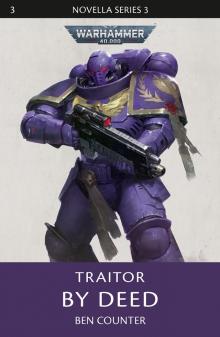 Traitor by Deed
Traitor by Deed Sacrifice
Sacrifice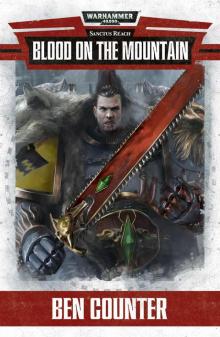 Blood on the Mountain
Blood on the Mountain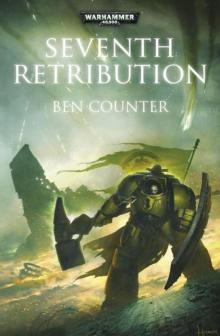 Seventh Retribution
Seventh Retribution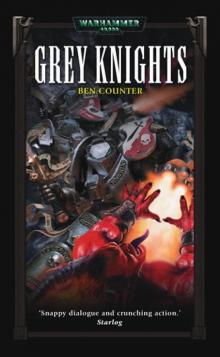 Grey Knights (Warhammer 40000)
Grey Knights (Warhammer 40000)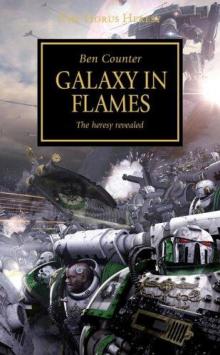 Galaxy in Flames
Galaxy in Flames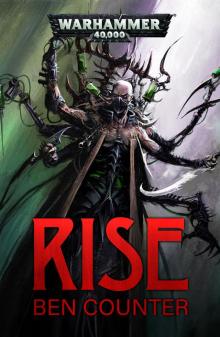 Rise – Ben Counter
Rise – Ben Counter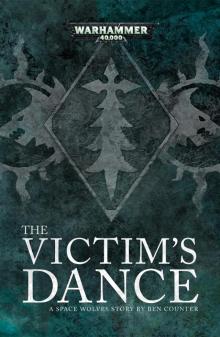 The Victim's Dance
The Victim's Dance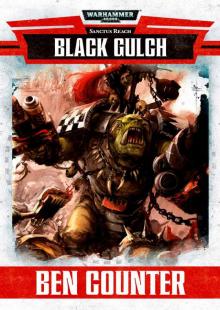 Black Gulch
Black Gulch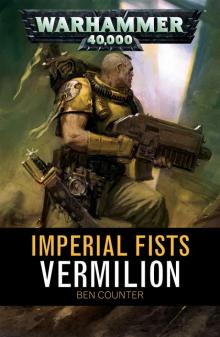 Vermilion
Vermilion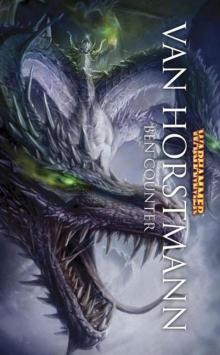 Van Horstmann
Van Horstmann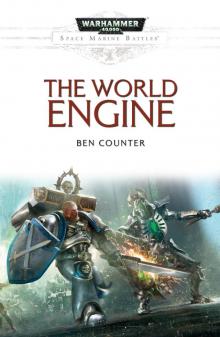 The World Engine
The World Engine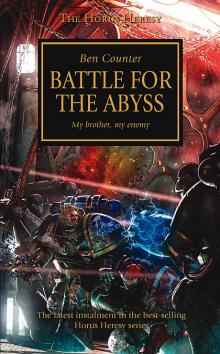 Battle for the Abyss
Battle for the Abyss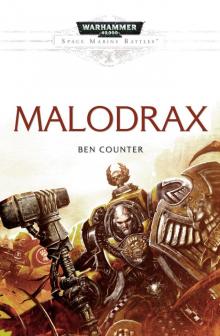 Malodrax
Malodrax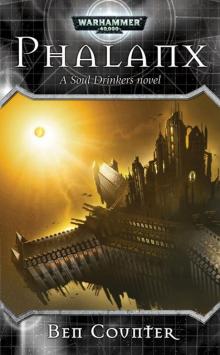 Soul Drinkers 06 - Phalanx
Soul Drinkers 06 - Phalanx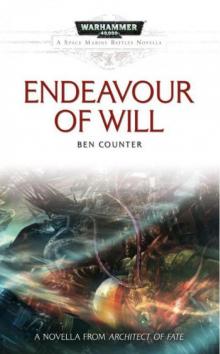 Endeavour of Will
Endeavour of Will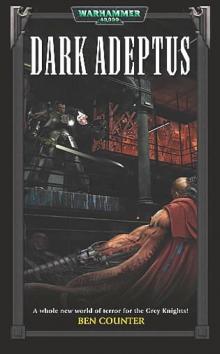 Dark Adeptus
Dark Adeptus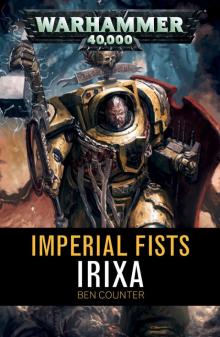 Irixa
Irixa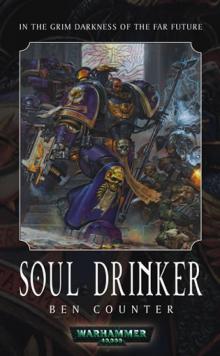 Soul Drinker
Soul Drinker